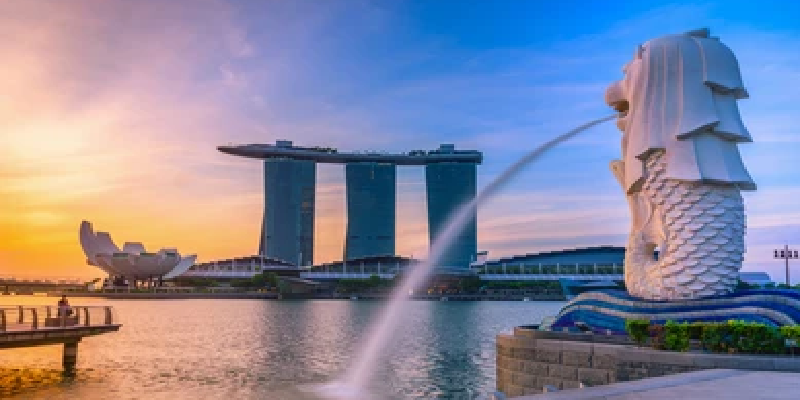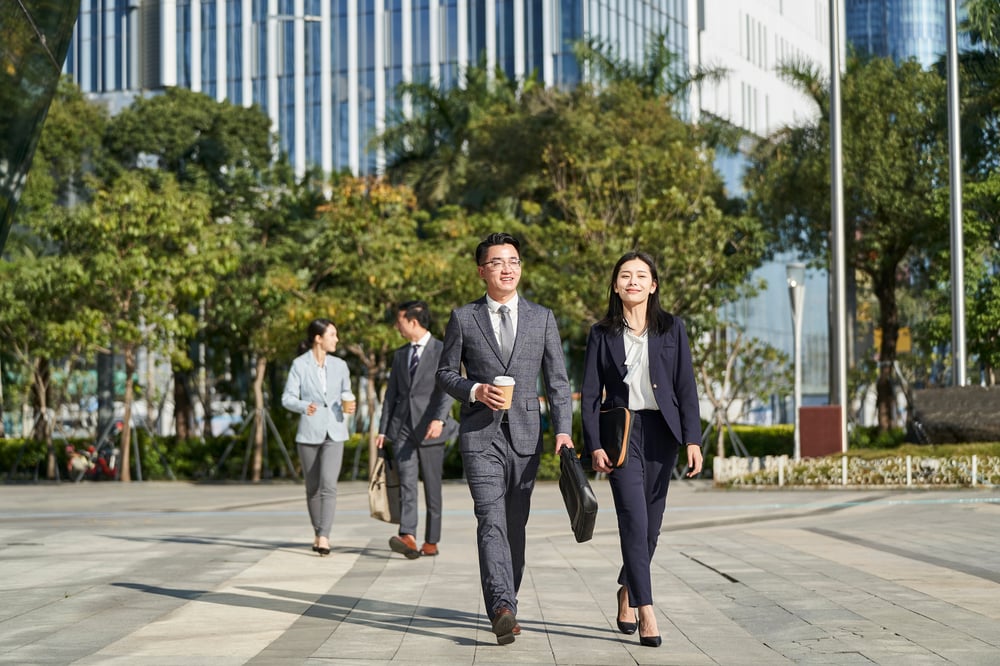Guide to hiring employees in Singapore
Everything you need to know when expanding your Singapore workforce
- Home
- Country Hiring Guides
- Singapore Hiring Guide

Source: Shutterstock/Nuttawut Uttamaharad
Employment trends and job market analysis in Singapore
As the world’s most globalised economy, Singapore has a reputation for providing excellent working conditions for both local and expat employees. English is the main working language spoken; however, this is balanced against the local society’s diverse mix of cultures including Chinese, Malay, and Indian.
Singaporean employees are highly regarded for their excellent work ethic and glowing higher education profiles. This puts Singapore on the map for businesses that intend to hire for C-suite executive positions.
| Capital | Singapore |
| Languages spoken | English, Malay, Mandarin & Tamil |
| Population size | 5.686 million |
| Payroll frequency | Monthly |
| Currency | Singapore Dollar (SGD) |
| VAT | 7% |
Taxes in Singapore
Employer contributions in Singapore
Central Provident Fund (CPF). A compulsory pension plan for Singaporean and PR workers in Singapore- aged 55 and below. It is used to provide funding for retirement, healthcare, and housing needs.
- 17% for employees aged 55 and below. For older employees, the rate falls between 14 to 7.5%.
Skills Development Levy (SDL). A compulsory levy used to support workforce upgrading programs and provide training grants to companies that send their employees on training programs the country’s National Continuing Education Training System.
- Up to 0.25%
Employee taxes in Singapore
Employees in Singapore must contribute to the CPF according to the rates below:
- 20% for ages 55 and below
- 13% for those aged between 55 to 60
Hours of work
Employees in Singapore work according to contractual working hours that are agreed between themselves and their employees. Common working days in Singapore look like the following:
• Up to 9 hours per day or 44 hours per work week for five days or less a week
• Up to 8 hours per day or 40 hours per work week for more than five days a week
Overtime
By law, employees should not be allowed to work for more than 12 hours a day however, under special circumstances, these hours can be stretched.
Employers can request their employees work for more than 12 hours under the following circumstances:
• There is an accident or threat of accident.
• It is for work that is essential to the life of the community, national defence or security.
• There is urgent work to be done to machinery or plant.
• There is an interruption of work that was impossible to foresee.
An employee can only work up to 72 hours of overtime in a month and anything beyond these hours requires the employer to apply for an exemption. For overtime work, the employer must pay eligible employees at least 1.5 times the basic hourly rate and issue payment within 14 days of the last day of the salary period.
Employee benefits in Singapore
Employers in Singapore are required by the Employment Act to provide their employees with statutory benefits including social security, leave entitlements, and termination and severance pay.
However, in today’s highly competitive employment market, companies that want to attract, hire, and retain employees must be able to provide supplementary employee benefits and perks that go beyond the basics.
The list below contains a selection of value-added benefits that can pad up your benefits package and help you to attract discerning employees:
• On-site wellness initiatives
• Mental health days
• Educational support
• Employee assistance programs
• Flexible spending dollars
• Volunteering days
• Home working allowance

Singapore Employment Amendment Bill
Singapore's Employment Amendment Bill (EAB) introduces significant changes to the Employment Act (EA), affecting all employees under a contract of service, including professional, managerial, and executive employees (PMEs), regardless of salary. Some key points to know about the EAB are:1. Coverage Extension: The EAB now covers all senior managers and CEOs at energy companies, irrespective of salary, requiring them to revise HR policies and employment processes to comply with the new provisions.
2. Unfair Dismissal Claims: The Employment Claims Tribunal (ECT) now handles unfair dismissal claims previously managed by the Ministry of Manpower. Employees covered by the EA can file claims to the ECT if they feel unjustly dismissed, seeking reinstatement with backpay or compensation. Employers must demonstrate "just cause" for termination.
3. Greater Worker Protection: Part IV of the EA, covering rest days, work hours, and overtime pay entitlements, now includes non-workmen earning up to S$2,600 monthly. Overtime benefits have increased, and employees can withdraw consent for salary deductions at any time.
4. Guaranteed Worker Benefits: All employees under the EA are entitled to statutory annual leave, paid statutory public holidays, and extra pay if they work on public holidays without a day off-in-lieu. Sick leave policies have also been modified, allowing any medical practitioner to certify illness for employee leave.
These changes emphasize the need for companies, especially in the energy sector, to adapt quickly and protect themselves against legal and workforce challenges to maintain operational efficiency and reputation.
Types of leave available in Singapore
Annual leave
Employees who have worked for their employees for a minimum of three months are eligible for paid annual leave. Annual leave entitlement in Singapore is dependent on the number of years of service an employee has performed within a company and begins. However, it is common for most companies to provide employees with 14 to 20 days of annual leave within their first year of service.
| Year(s) of service | Days of leave |
| 1st | 7 |
| 2nd | 8 |
| 3rd | 9 |
| 4th | 10 |
| 5th | 11 |
| 6th | 12 |
| 7th | 13 |
| 8th | 14 |
Sick leave
Employees in Singapore get 14 days of paid sick leave in a year upon completion of six months of work. If hospitalisation is required, they are entitled to 60 days of leave per year, including 14 days of outpatient care.
Before they complete 6 months of service, the number of paid sick leave days they receive will be based on their length of employment at the time.
• Up to three months – five days per year, 15 days if hospitalisation is necessary
• Four months – eight days per year, 45 days in the event of hospitalisation
• Five months – 11 days per year, 45 days- in the event of hospitalisation
• Six months + – 14 days per year, 60 days in the event of hospitalisation
Adoption leave
Eligible adoptive mothers are entitled to 12 weeks of paid adoption leave to care for their adopted infants under the following criteria:
The adopted child is below the age of 12 months at the point of the formal intent to adopt. The “formal intent to adopt” happens:
- One of the adoptive parents must be a Singapore citizen.
- The child must become a Singapore citizen within 6 months of the adoption.
If the child is a foreigner:
- One of the adoptive parents must be a Singapore citizen.
- The child must become a Singapore citizen within 6 months of the adoption.
The employee has worked for the company or has been self-employed for a continuous period of at least 3 months immediately before the formal intent to adopt.
The adoption order must be passed within 1 year from the formal intent to adopt.
Childcare leave
According to the Employment Act, working parents of Singapore citizen children are entitled to six days of paid childcare leave per year. Parents of non-citizens are entitled to two days of childcare leave.
Employees are entitled to Government-Paid Childcare Leave (GPCL) if they meet the following requirements:
- The child is below 7 years old
- The child is a Singapore citizen
- The employee has provided three months of continuous service to their company
- If self-employed, they have been engaged for at least three continuous months of work and have lost income during the childcare leave period
Maternity leave
Expectant mothers who have been employed by the company for more than three months prior to giving birth are eligible for 16 weeks for pregnancy leave. During this period, companies are not allowed to terminate the employment contract. Maternity leave is reduced to 12 weeks if the child is not a Singapore citizen.
For the first two children, the first eight weeks of compensation is covered by the employee and the balance will be reimbursed by the government. However, from the third child, all 16 weeks of maternity leave is reimbursed by the government.
Paternity leave
Working fathers are entitled to two weeks’ worth of Government-Paid Paternity Leave (GPPL) in Singapore. The criteria are as follows:
- The child is a Singapore citizen
- The employee has been lawfully married to the child’s mother between conception and birth
- The employee has served their company for a continuous period of at least three months before the birth of the child
- If self-employed, they have been engaged in work for a continuous period of at least three months before the birth of the child, and have lost income during the paternity leave period
Shared parental leave
As a working father, an employee can apply to share up to four weeks of their spouse’s 16 weeks of Government-Paid Maternity Leave, subject to their spouse’s agreement.
Unpaid infant care leave
All working parents in Singapore are eligible for six days of unpaid infant care leave per year provided they meet the following requirements:
- The child is a Singapore citizen
- The child is less than two years of age
- They have provided their current employer with three months of continuous service
Attracting Singaporean talent
Here are some tips on how to employee people in Singapore:
Today’s candidate-centric market requires companies to find innovative ways to attract candidates who want to work for them. Finding the right person to fill an open position is no simple task and hiring managers face a difficult challenge. Excellent benefits and culture are essential for attracting and retaining talented employees in Singapore, but here are some additional things that companies can do to improve their chances of success.
Leadership
Make sure that your managers at every level within your organisation are the best fit for their position. Poor leadership can drive away employees fast. Excellent leadership comes from years of experience and practice, which is why leadership training is essential to securing managers and department heads capable of engaging, inspiring and retaining employees.
Flexible working hours
According to a study conducted by Singapore's Institute of Policy Studies (IPS), 41 to 52% of employees believe that flexible work arrangements should be part of the new norm. Researchers also found that employees who had the ability to choose between different types of work arrangements reported better psychological well-being than those who did not.
For companies that are doing the opposite by forcing employees back to the workplace against their will, workstyle consultant Hardeep Matharu warns that the consequences of this can be dire. "There are very real risks of not just losing top talent, but also reducing their ability to attract talent,'' he says.
Learning & development (L&D)
Professionals in Singapore value the potential for career growth and learning opportunities. It's especially important because employees with the opportunity for training can continue contributing to their companies as the business evolves over time. Learning and development (L&D) investment can help businesses attract potential new employees and foster loyalty among their existing ones.
When marketing jobs and positions, companies should make sure they're communicating these opportunities for professional growth and development.
Diversity, equity & inclusion (DEI)
Over the past few years, public awareness of DEI has increased, and an increasing number of employees are considering DEI a significant priority when evaluating potential employers. A survey by the Singapore National Employers Federation (SNEF) and Kincentric found that 71% of employers recognised the positive impact of DEI on company culture and 55% recognised its impact on employee engagement.
A diverse and inclusive workforce is able to increase productivity and create a culture of innovation that can positively impact a business's bottom line.

Termination of employment in Singapore
In Singapore, the notice period is subject to the length of employment.
- Employees who have served less than 26 weeks must provide one days’ notice
- Employees who have served between 26 weeks to two years must provide one weeks’ notice
- Employees who have served between two years to less than five years must provide two weeks’ notice
- Employees who have served five years or more must provide four weeks’ notice
For employees who are still on probation, either the employee or employer can terminate the employment by providing five days’ notice.
Probation periods in Singapore is often based on whatever is agreed on in the contract or between the company and employee but typically lasts for three months.
How can I hire employees in Singapore?
If you're looking for ways to hire people in Singapore, Airswift has a range of employment solutions that make hiring staff easier than ever before. We're experts at finding qualified candidates for your job openings, so we take care of everything else. You can just focus on growing your business!
Businesses can look into staff hiring options including:
Talent Acquisition
Work with in-country talent acquisition specialists who can help you source top-quality candidates and hire locally in a competitive market.
Our contract hire service is designed to help you fill short-term roles and give your company the flexibility to respond to changes in need and market demand.
If you need to hire local talent for longer than a few months, our professional search service can help you find highly-skilled talent in Singapore for permanent roles within your company.
Employer of Record
If you're looking for ways to hire remote workers without having to set up a physical office, an Employer of Record in Singapore makes it easier than ever to hire.
As an EOR, we help our clients avoid the hassles of setting up their own HR department by handling everything from compliance to employee onboarding and statutory benefits.
If you'd like to know more about how we can help you hire employees in Singapore, please get in touch with us today!
Speak to an expert
Although the information provided has been produced from sources believed to be reliable, Airswift makes no warranties, whether express or implied, regarding the accuracy, adequacy, completeness, legality, or reliability of any information herein. Accordingly, there shall be no liability attached to the use of the information herein, howsoever arising. For the latest information and specific queries regarding particular cases, please contact our team.
Table of Contents
Find out more
Learn how Airswift can help you hire employees in Singapore
Find out about workforce solutions in Singapore

